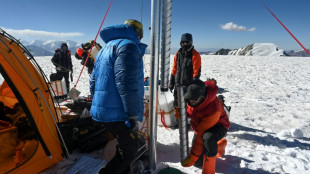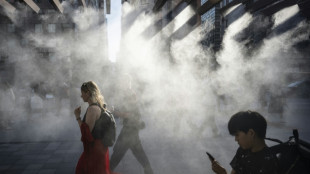
-
 Scandic Trust Group strengthens sales network with First Idea Consultant
Scandic Trust Group strengthens sales network with First Idea Consultant
-
Frank says Spurs supporting Udogie through 'terrible situation'

-
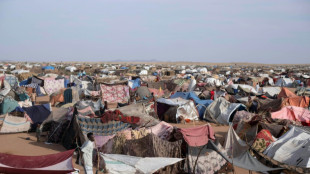 MSF warns of missing civilians in Sudan's El-Fasher
MSF warns of missing civilians in Sudan's El-Fasher
-
Norris on top as McLaren dominate opening Sao Paulo practice

-
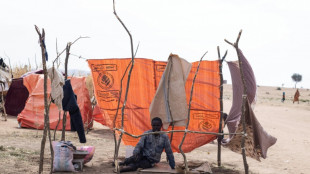 UN warns 'intensified hostilities' ahead in Sudan despite RSF backing truce plan
UN warns 'intensified hostilities' ahead in Sudan despite RSF backing truce plan
-
Seven hospitalized after suspicious package opened at US base

-
 Guardiola says 'numbers are insane' as he reaches 1,000 games in charge
Guardiola says 'numbers are insane' as he reaches 1,000 games in charge
-
Brazil welcomes China lift of ban on poultry imports
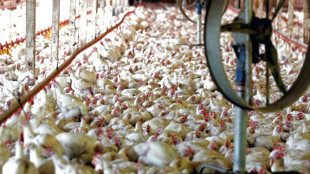
-
 Scotland captain Tuipulotu bids for landmark win over All Blacks
Scotland captain Tuipulotu bids for landmark win over All Blacks
-
Woman convicted in UK of harassing Maddie McCann's parents
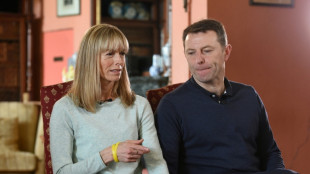
-
 Tanzania charges more than 100 with treason over election protests
Tanzania charges more than 100 with treason over election protests
-
Nexperia chip exports resuming: German auto supplier

-
 Genge warns England to beware 'nasty' Fiji at Twickenham
Genge warns England to beware 'nasty' Fiji at Twickenham
-
Stocks fall on renewed AI bubble fears

-
 UK grandmother on Indonesia death row arrives back in London
UK grandmother on Indonesia death row arrives back in London
-
Spanish star Rosalia reaches for divine in new album

-
 Portugal's Mendes out injured as Neves returns for World Cup qualifiers
Portugal's Mendes out injured as Neves returns for World Cup qualifiers
-
Afghan-Pakistan peace talks push ahead after border clashes

-
 Fleetwood in tie for lead at halfway stage in Abu Dhabi
Fleetwood in tie for lead at halfway stage in Abu Dhabi
-
Brazil court starts hearing Bolsonaro appeal

-
 Serbia fast-tracks army HQ demolition for Trump family hotel
Serbia fast-tracks army HQ demolition for Trump family hotel
-
Ireland captain Doris 'mentally stronger' after long break

-
 MSF accuses powerful nations of weakening S.Africa's G20 health text
MSF accuses powerful nations of weakening S.Africa's G20 health text
-
Maresca defends Chelsea rotation policy after Rooney criticism

-
 Hundreds of flights cut across US in government paralysis
Hundreds of flights cut across US in government paralysis
-
Xhaka 'made me a better coach', says Arsenal boss Arteta

-
 Central Nigerian town rebuilds religious trust in shadow of Trump's threat
Central Nigerian town rebuilds religious trust in shadow of Trump's threat
-
Inside Germany's rare earth treasure chest
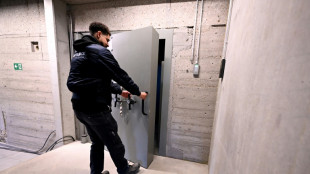
-
 Former jihadist Syrian leader makes unprecedented White House visit
Former jihadist Syrian leader makes unprecedented White House visit
-
Kagiyama takes NHK lead in Japan to kick-start Olympic season

-
 Ikea profits drop on lower prices, tariff costs
Ikea profits drop on lower prices, tariff costs
-
European, Asian stocks decline after Wall Street slide
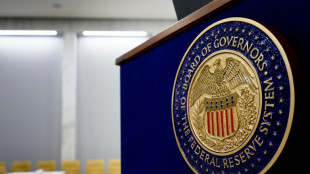
-
 Tuchel brings 'immense' Bellingham and Foden back into England fold
Tuchel brings 'immense' Bellingham and Foden back into England fold
-
German FA extends with president Neuendorf until 2029

-
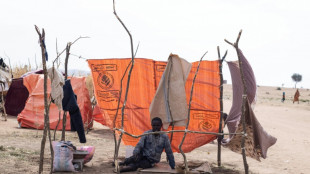 No end to Sudan fighting despite RSF paramilitaries backing truce plan
No end to Sudan fighting despite RSF paramilitaries backing truce plan
-
US officials, NGOs cry foul as Washington snubs UN rights review

-
 Injured teen medal hope Tabanelli risks missing home Winter Olympics
Injured teen medal hope Tabanelli risks missing home Winter Olympics
-
Bellingham, Foden recalled to England squad for World Cup qualifiers

-
 Tanzania rights group condemns 'reprisal killings' of civilians
Tanzania rights group condemns 'reprisal killings' of civilians
-
Slot urges patience as Isak returns to training with Liverpool

-
 Rees-Zammit set for Wales return with bench role against Argentina
Rees-Zammit set for Wales return with bench role against Argentina
-
China's new aircraft carrier enters service in key move to modernise fleet

-
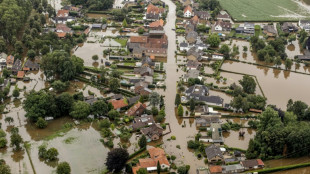 Operation Cloudburst: Dutch train for 'water bomb' floods
Operation Cloudburst: Dutch train for 'water bomb' floods
-
Leaders turn up the heat on fossil fuels at Amazon climate summit

-
 US travel woes mount as govt shutdown prompts flight cuts
US travel woes mount as govt shutdown prompts flight cuts
-
North Korea fires unidentified ballistic missile: Seoul military

-
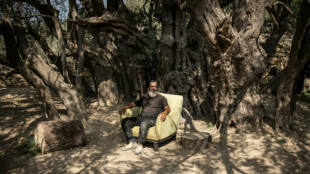 West Bank's ancient olive tree a 'symbol of Palestinian endurance'
West Bank's ancient olive tree a 'symbol of Palestinian endurance'
-
Global tech tensions overshadow Web Summit's AI and robots

-
 Green shines as Suns thump Clippers 115-102
Green shines as Suns thump Clippers 115-102
-
Japan to screen #MeToo film months after Oscar nomination

| RYCEF | -1.21% | 14.82 | $ | |
| CMSC | -0.17% | 23.74 | $ | |
| RBGPF | 0% | 76 | $ | |
| VOD | 1.95% | 11.566 | $ | |
| NGG | 0.95% | 77.02 | $ | |
| SCS | 0.13% | 15.78 | $ | |
| GSK | -0.82% | 46.715 | $ | |
| RIO | -0.95% | 68.62 | $ | |
| BTI | 0.36% | 54.405 | $ | |
| AZN | 0.99% | 84.605 | $ | |
| CMSD | -0.37% | 23.922 | $ | |
| RELX | -2.55% | 42.31 | $ | |
| BCE | -0.13% | 23.14 | $ | |
| BCC | 0.31% | 70.95 | $ | |
| BP | 0.93% | 36.155 | $ | |
| JRI | -0.62% | 13.665 | $ |

Dogs die as South Africa snake antivenom shortage bites
Zarza, a much-loved Staffordshire terrier, ended up at a South African animal hospital with a bite from a Mozambique spitting cobra on her snout.
The snake's powerful venom can stop the breathing muscles from working, but normally the bites are treatable with an antidote.
The problem, say South African veterinarians, is that they currently have virtually no vials of the antiserum left.
"We've been out of antivenom for quite some months now," said Dean de Kock, a vet at the Valley Farm Animal Hospital in Pretoria, where Zarza was treated but eventually died.
Vets and snake experts say the shortage started getting serious towards the end of last year -- though the authorities are denying there is a problem.
"Snakebite antivenom is available in the country," the National Health Laboratory Service (NHLS), a government body in charge of antidote production, told AFP.
Experts in the field disagree.
- A 'countrywide shortage' -
In April, a group of snakebite treatment specialists pleaded with the health minister over what they described as "a major health risk".
While the supply problems may be easing in some quarters, vets say they are still struggling.
Hospitals treating humans get priority when any new doses come available, said Johan Marais, a herpetologist -- specialist in reptiles and amphibians -- who heads the African Snakebite Institute.
"At the moment, if you're a veterinarian, you cannot get antivenom," said Marais, 65.
Speaking from his headquarters in Pretoria, he casually handled a black mamba during his conversation with AFP.
He said he receives up to a dozen calls a day from desperate animal doctors and dog owners looking for antidotes.
"If your dog gets a serious snakebite today, there's a likelihood it's going to die," Marais said.
Alan Kloeck, of the South African Veterinary Association, confirmed Marais's remarks, describing a "countrywide shortage" with vets unable to get their hands on the antiserum they needed.
- Horse blood, spitting cobras -
South Africa is home to about 160 species of snakes, many of them poisonous.
South African Vaccine Producers -- a NHLS subsidiary and the only antivenom maker in the country -- produces two antidotes.
One can treat bites from 10 snakes including the cape cobra, the puff adder and the green mamba, while another is for relatively rare boomslang bites.
Making the antiserums is a laborious process, said Mike Perry of African Reptiles and Venom, a venom-extraction firm in Centurion, outside Johannesburg, that houses around 900 snakes in small glass cages.
He said his team forces the hissing reptiles to spit out their poison by forcing them to bite a glass jar.
Small quantities of the toxins are then injected into horses, which over time develop immunity.
Their plasma is then harvested and processed to make the serum.
But that process requires constant refrigeration, and the production backlog has been blamed in large part on South Africa's energy crisis, which has caused repeated power blackouts.
In April, NHLS said it required "a consistent and dependable power supply" to produce antivenom.
The continuous switchover to generators during outages interrupted production and affected stockpiles, it said, forcing it to invest in backup power systems and renewable energy.
- 'Last vial' -
Last week, NHLS said it had increased manufacturing in recent months.
Since January, it said, it had delivered antivenom to more than 230 institutions, including hospitals and veterinary clinics, fulfilling all orders apart from "a small backlog" affecting a provincial depot.
But de Kock, whose veterinary practice is in a different province, has not received any shipments since December. For a while, they were using expired doses from other hospitals, but these too have dried up.
"We have used the last vial on Sunday evening," he said last week.
Over the past three months, the hospital treated 25 dogs for snakebites.
Of the 16 who could get expired antivenom, only one did not survive, while six of the nine who could not get doses died.
Zarza was among them, dying in May after a two-day struggle on a ventilator.
"It's tough," said de Kock, 53. "You're doing everything you can but the vital thing that you actually need is the antivenom, and you don't have that".
His hope was that the austral winter months, when snakes are less active, would bring some relief.
J.AbuHassan--SF-PST

